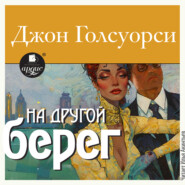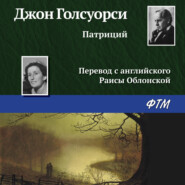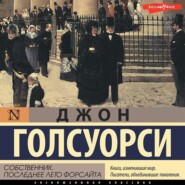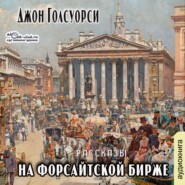По всем вопросам обращайтесь на: info@litportal.ru
(©) 2003-2024.
✖
The Patrician
Настройки чтения
Размер шрифта
Высота строк
Поля
Miltoun’s answer: “I came up to tell you some thing, sir,” riveted his father’s stare for a second longer than was quite urbane.
It would not be true to say that Lord Valleys was afraid of his son. Fear was not one of his emotions, but he certainly regarded him with a respectful curiosity that bordered on uneasiness. The oligarchic temper of Miltoun’s mind and political convictions almost shocked one who knew both by temperament and experience how to wait in front. This instruction he had frequently had occasion to give his jockeys when he believed his horses could best get home first in that way. And it was an instruction he now longed to give his son. He himself had ‘waited in front’ for over fifty years, and he knew it to be the finest way of insuring that he would never be compelled to alter this desirable policy – for something in Lord Valleys’ character made him fear that, in real emergency, he would exert himself to the point of the gravest discomfort sooner than be left to wait behind. A fellow like young Harbinger, of course, he understood – versatile, ‘full of beans,’ as he expressed it to himself in his more confidential moments, who had imbibed the new wine (very intoxicating it was) of desire for social reform. He would have to be given his head a little – but there would be no difficulty with him, he would never ‘run out’ – light handy build of horse that only required steadying at the corners. He would want to hear himself talk, and be let feel that he was doing something. All very well, and quite intelligible. But with Miltoun (and Lord Valleys felt this to be no, mere parental fancy) it was a very different business. His son had a way of forcing things to their conclusions which was dangerous, and reminded him of his mother-in-law. He was a baby in public affairs, of course, as yet; but as soon as he once got going, the intensity of his convictions, together with his position, and real gift – not of the gab, like Harbinger’s – but of restrained, biting oratory, was sure to bring him to the front with a bound in the present state of parties. And what were those convictions? Lord Valleys had tried to understand them, but up to the present he had failed. And this did not surprise him exactly, since, as he often said, political convictions were not, as they appeared on the surface, the outcome of reason, but merely symptoms of temperament. And he could not comprehend, because he could not sympathize with, any attitude towards public affairs that was not essentially level, attached to the plain, common-sense factors of the case as they appeared to himself. Not that he could fairly be called a temporizer, for deep down in him there was undoubtedly a vein of obstinate, fundamental loyalty to the traditions of a caste which prized high spirit beyond all things. Still he did feel that Miltoun was altogether too much the ‘pukka’ aristocrat – no better than a Socialist, with his confounded way of seeing things all cut and dried; his ideas of forcing reforms down people’s throats and holding them there with the iron hand! With his way too of acting on his principles! Why! He even admitted that he acted on his principles! This thought always struck a very discordant note in Lord Valleys’ breast. It was almost indecent; worse-ridiculous! The fact was, the dear fellow had unfortunately a deeper habit of thought than was wanted in politics – dangerous – very! Experience might do something for him! And out of his own long experience the Earl of Valleys tried hard to recollect any politician whom the practice of politics had left where he was when he started. He could not think of one. But this gave him little comfort; and, above a piece of late asparagus his steady eyes sought his son’s. What had he come up to tell him?
The phrase had been ominous; he could not recollect Miltoun’s ever having told him anything. For though a really kind and indulgent father, he had – like so many men occupied with public and other lives – a little acquired towards his offspring the look and manner: Is this mine? Of his four children, Barbara alone he claimed with conviction. He admired her; and, being a man who savoured life, he was unable to love much except where he admired. But, the last person in the world to hustle any man or force a confidence, he waited to hear his son’s news, betraying no uneasiness.
Miltoun seemed in no hurry. He described Courtier’s adventure, which tickled Lord Valleys a good deal.
“Ordeal by red pepper! Shouldn’t have thought them equal to that,” he said. “So you’ve got him at Monkland now. Harbinger still with you?”
“Yes. I don’t think Harbinger has much stamina.
“Politically?”
Miltoun nodded.
“I rather resent his being on our side – I don’t think he does us any good. You’ve seen that cartoon, I suppose; it cuts pretty deep. I couldn’t recognize you amongst the old women, sir.”
Lord Valleys smiled impersonally.
“Very clever thing. By the way; I shall win the Eclipse, I think.”
And thus, spasmodically, the conversation ran till the last servant had left the room.
Then Miltoun, without preparation, looked straight at his father and said:
“I want to marry Mrs. Noel, sir.”
Lord Valleys received the shot with exactly the same expression as that with which he was accustomed to watch his horses beaten. Then he raised his wineglass to his lips; and set it down again untouched. This was the only sign he gave of interest or discomfiture.
“Isn’t this rather sudden?”
Miltoun answered: “I’ve wanted to from the moment I first saw her.”
Lord Valleys, almost as good a judge of a man and a situation as of a horse or a pointer dog, leaned back in his chair, and said with faint sarcasm:
“My dear fellow, it’s good of you to have told me this; though, to be quite frank, it’s a piece of news I would rather not have heard.”
A dusky flush burned slowly up in Miltoun’s cheeks. He had underrated his father; the man had coolness and courage in a crisis.
“What is your objection, sir?” And suddenly he noticed that a wafer in Lord Valleys’ hand was quivering. This brought into his eyes no look of compunction, but such a smouldering gaze as the old Tudor Churchman might have bent on an adversary who showed a sign of weakness. Lord Valleys, too, noticed the quivering of that wafer, and ate it.
“We are men of the world,” he said.
Miltoun answered: “I am not.”
Showing his first real symptom of impatience Lord Valleys rapped out:
“So be it! I am.”
“Yes?”, said Miltoun.
“Eustace!”
Nursing one knee, Miltoun faced that appeal without the faintest movement. His eyes continued to burn into his father’s face. A tremor passed over Lord Valleys’ heart. What intensity of feeling there was in the fellow, that he could look like this at the first breath of opposition!
He reached out and took up the cigar-box; held it absently towards his son, and drew it quickly back.
“I forgot,” he said; “you don’t.”
And lighting a cigar, he smoked gravely, looking straight before him, a furrow between his brows. He spoke at last:
“She looks like a lady. I know nothing else about her.”
The smile deepened round Miltoun’s mouth.
“Why should you want to know anything else?”
Lord Valleys shrugged. His philosophy had hardened.
“I understand for one thing,” he said coldly; “that there is a matter of a divorce. I thought you took the Church’s view on that subject.”
“She has not done wrong.”
“You know her story, then?”
“No.”
Lord Valleys raised his brows, in irony and a sort of admiration.
“Chivalry the better part of discretion?”
Miltoun answered:
“You don’t, I think, understand the kind of feeling I have for Mrs. Noel. It does not come into your scheme of things. It is the only feeling, however, with which I should care to marry, and I am not likely to feel it for anyone again.”
Lord Valleys felt once more that uncanny sense of insecurity. Was this true? And suddenly he felt Yes, it is true! The face before him was the face of one who would burn in his own fire sooner than depart from his standards. And a sudden sense of the utter seriousness of this dilemma dumbed him.
“I can say no more at the moment,” he muttered and got up from the table.
CHAPTER XI
Lady Casterley was that inconvenient thing – an early riser. No woman in the kingdom was a better judge of a dew carpet. Nature had in her time displayed before her thousands of those pretty fabrics, where all the stars of the past night, dropped to the dark earth, were waiting to glide up to heaven again on the rays of the sun. At Ravensham she walked regularly in her gardens between half-past seven and eight, and when she paid a visit, was careful to subordinate whatever might be the local custom to this habit.
When therefore her maid Randle came to Barbara’s maid at seven o’clock, and said: “My old lady wants Lady Babs to get up,” there was no particular pain in the breast of Barbara’s maid, who was doing up her corsets. She merely answered “I’ll see to it. Lady Babs won’t be too pleased!” And ten minutes later she entered that white-walled room which smelled of pinks-a temple of drowsy sweetness, where the summer light was vaguely stealing through flowered chintz curtains.
Barbara was sleeping with her cheek on her hand, and her tawny hair, gathered back, streaming over the pillow. Her lips were parted; and the maid thought: “I’d like to have hair and a mouth like that!” She could not help smiling to herself with pleasure; Lady Babs looked so pretty – prettier asleep even than awake! And at sight of that beautiful creature, sleeping and smiling in her sleep, the earthy, hothouse fumes steeping the mind of one perpetually serving in an atmosphere unsuited to her natural growth, dispersed. Beauty, with its queer touching power of freeing the spirit from all barriers and thoughts of self, sweetened the maid’s eyes, and kept her standing, holding her breath. For Barbara asleep was a symbol of that Golden Age in which she so desperately believed. She opened her eyes, and seeing the maid, said:
“Is it eight o’clock, Stacey?”

















